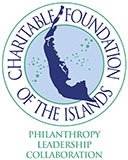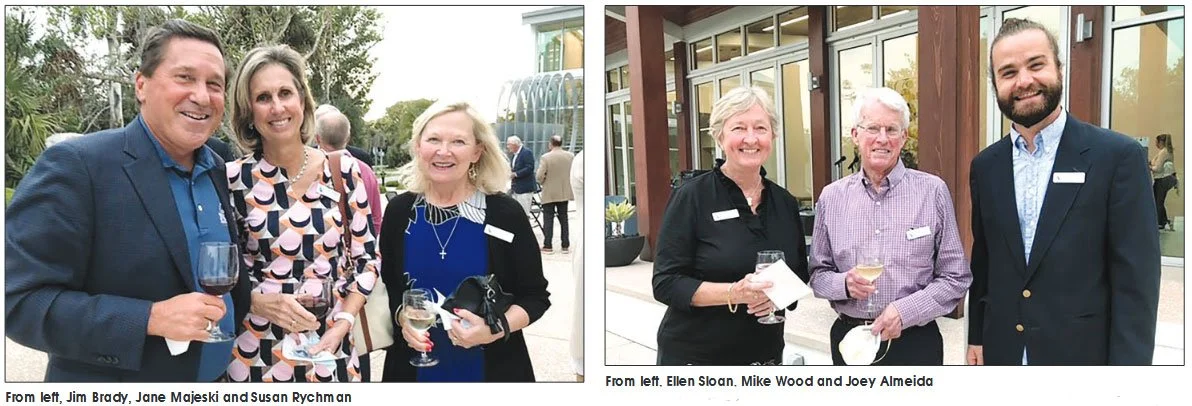THE PRESS
Leadership Sanibel-Captiva 2022
The Leadership Sanibel-Captiva program of the Charitable Foundation of the Islands kicked of in January 2022 with a class orientation and Opening Keynote session with Porter and Chauncey Goss. The keynote focus was the Sanibel Plan – its history, challenges, and triumphs. The Plan played an important role as the context for all the sessions that followed: Government, Environment, Social Services, Business & Prosperity, and Arts & Culture. The program culminated with a beautiful “graduation” dinner at the Captiva Island Yacht Club.
Hats of to the 2022 inaugural Leadership Sanibel-Captiva planning committee. They worked tirelessly to create a dynamic, exciting, and extremely successful program intended to inspire an ever-growing pool of talented and passionate people interested in preserving and growing the Islands’ extraordinary quality of life.
Jane Majeski, Chair
Jim Brady
Calli Johnson
Elizabeth Piersol
Susan Ryckmann
Bob Wiesemann
Mike Wood
Kick Off Session
January 11
Porter and Chauncey Goss
Father And Son Team Kicks Off New Initiative
Porter Goss, former CIA director under George HW Bush, and son Chauncey Goss, chairman, founder and managing partner of Goss Practical Solutions and appointee of Gov. Ron DeSantis as board chairman of the South Florida Water Management District, launched the inaugural class of
the Charitable Foundation of the Islands (CFI) Leadership Sanibel-Captiva recently.
The initiative is intended to engage future community leaders in civic, nonprofit and government roles that support and advance the quality of life on the islands. The audience, comprised of the board of directors of the foundation and the 12-member leadership class, sat in attention as Chauncey interviewed his father about the early days of the creation of the Sanibel Plan and his role in its development. Porter painted a picture of what the islands were like in the 1960s as the plan was being developed. “You could drive from the Sanibel Lighthouse to Captiva without seeing one car,” he
said. He went on to note that contrary to common belief, those early days were not, in fact, smooth sailing, and not everyone was on board. The long and sometimes rocky road that led to the final passage of the Sanibel Plan required the full engagement of all the people in the community.
“There were committees upon committees all across the island and a wide diversity of options and ideas on the table,” said Porter. “But most of all
it was nonpolitical, non-combative and totally transparent.” The community envisioned and designed the model that ultimately empowered the small town to claim its own destiny and limit state and federal intrusion and excessive land development.
“I was convinced then, and it has come to be, that the islands’ economic health and its desirability as a place to live lay in quality, rather than quantity development,” Porter said. A good example is the bike path. The State of Florida was approached to help fund the path and it refused. “So, the ‘moms’ across the island took over, created a working committee, and made it happen,” said Porter. Chauncey asked if the Sanibel Plan development process was a “slam dunk,” and Porter responded by saying that that was a myth.
Not everyone on Sanibel was “all in.” It was a very long process, which involved engaging the entire community, Lee County and the State of Florida, and it hatched lawsuits upon lawsuits. “The process server, who was a friend of mine, was a regular at our doorstep. We always invited him in for coffee. With the help of top-notch legal minds from Chicago, we won every lawsuit,” said Porter.
Today, the Sanibel Plan is a model studied in universities across the United States. Asked by one audience member what he thought was one of the most pressing initiatives of the day, Porter responded that environmental integrity and protection are important now to keep the value asset we created. “It is up to all of us, especially new generations of islanders, to step into the arena and make sure we protect what we have created. It is up to more people like my son, Chauncey, who is committed to the hard and often tedious work of staying the course.”
Porter’s dialogue with his son, both of whom have a laudable commitment to community, accomplished what the leadership planners had intended: to establish a baseline for the class for each of the sessions (Government, Environment, Business, Social Services and Arts & Culture) to follow throughout the season. All point back to, or are in different ways influenced by, the Sanibel Plan.
“We are profoundly grateful to Porter and Chauncey, not only for their work, but their commitment to help the Leadership Sanibel-Captiva program work for years to come,” said Ralph Clark, chair of the leadership planning committee. “The Charitable Foundation of the Islands has embarked upon creating, with our nonprofit partners, meaningful programs with long-lasting quantitative results. With the participation and financial support of our community, we can make that happen,” said Chip Roach, foundation board chairman.
Charitable Foundation of the Islands is a 501(c)3 nonprofit organization committed to identifying community needs and collaborative opportunities that empower organizations to affect real change, support those in need, and build and distribute resources that advance the vitality and health of the Sanibel-Captiva community. For information, visit www. mycfi.org, email sancapcfi@gmail.com or call 322-3818.
Government, January 26 & Environment, February 2
Leadership Class Hears Latest On Local Issues
The first Leadership Sanibel-Captiva full-day session took place on January 26 and focused on city and county government. The inaugural class heard from Sanibel Mayor Holly Smith, City Manager Dana Souza and the heads of local government departments. They discussed how each department interacts with the public, what issues are “front and center,” and the city’s role in creating and supporting community solutions.
Following the morning session, the class traveled to Fort Myers and met with District 1 County Commissioner Kevin Ruane and David Mintz, vice president of Captiva Community Panel and chair of the panel’s code and ordinances committee. Ruane and Mintz outlined the structure of each entity they represent, the roles they play, and discussed the current projects and partnerships that are being formed to address the issues surrounding environment and water quality.
Environment Day followed on February 2 and was a look at the diverse role of several environmental organizations in addressing issues of sea rise, climate change, animal protection and education. The program was hosted by Sanibel- Captiva Conservation Foundation (SCCF) and CEO James Evans. This session dug down a little deeper into the critical issues of climate change, water quality, research and SCCF’s role in addressing the
environmental issues brought forth in the previous two class sessions: the opening presentation by Porter and Chauncy Goss and Government Day.
By traveling to each of the following organizations, the class got a comprehensive look at some of the organizations in the mosaic of partners handling various aspects of environment education and protection on Sanibel and Captiva: Clinic for the Rehabilitation of Wildlife (CROW), JN
“Ding” Darling National Wildlife Refuge, Captiva Erosion Prevention District and SCCF Marine Lab. “We are excited to see a new leadership community orientation program on Sanibel and Captiva and applaud CFI for creating it. Future engaged leaders are the linchpin for the preservation of the extraordinary life we enjoy on Sanibel and Captiva,” said Evans.
Business & Prosperity, February 8
Leadership Class Hears Latest On Local Economy
The Leadership Sanibel-Captiva Program, an initiative of the Charitable Foundation of the Islands, held its Business & Community Prosperity Day on February 2. The morning session was held at The Sanctuary Golf Club with speakers John Talmage, director of Lee County Economic Development Office, and John Lai, president and CEO of Sanibel & Captiva Islands Chamber of Commerce.
Lai and Talmadge spoke about the meteoric rise in the economy of Lee County and Sanibel and Captiva islands. The discussion included how to balance the Sanibel Plan to preserve and protect the natural environment while encouraging local business success. The class then traveled to ‘Tween Waters Island Resort for lunch hosted by Tony Lapi, CFI board member.
The afternoon featured presentations by: Chuck Ketteman, former Sanibel planning commissioner; Tony Lapi; Tamara Pigott, executive director of Lee County Visitor and Convention Bureau; Jamie Reid, principal of The Sanibel School; and Eric Pfeifer, president of Pfeifer Realty Group. The session was filled with information regarding the history, growth, current conditions and economic forecast for both the islands and surrounding county. The afternoon featured a look at the various iterations of the Sanibel Plan since the 1970s, and the impact the plan has had on growth and development. Of particular interest to the class was the dramatic impact the islands’ success and desirability has had on rising cost of living, shrinking affordable housing for the middle class and dramatic decline in enrollment at The Sanibel School, one of the most academically successful schools in the state of Florida.
The next session will focus on social services including the issues of affordable housing for working class families, the needs of the islands’ underserved population and what is being done to address those critical issues. The purpose of the program is to educate leaders about the challenges and opportunities present on the islands, build connections and collaborations between people and ideas, and prepare and encourage the next generation of leaders to be committed to strengthening and improving the quality of life in the community.
For more information visit www.mycfi.org or call 322-3818
Social Services, February 22
Leadership Group Explores Social Services
The fifth of six, full-day class sessions for the newly launched Sanibel-Captiva Leadership Program washeld on February 22 with a focus on the
social services needed and available on the islands. Leadership Sanibel-Captiva is an initiative of Charitable Foundation of the Islands. The program focuses on different aspects of the community with presentations from experts within those sectors – to better understand the issues, needs and opportunities for leadership service. The curriculum included an opening session by keynote speaker Porter Goss, followed by government, business and community prosperity, environment and, this past week, social services. The final session prior to the
graduation dinner on March 22 at Captiva Island Yacht Club will be arts and culture with presenters from Captiva Civic Association, Rauschenberg Institute, The Community House and BIG ARTS.
The social services session included a trip to FISH of SanCap, where the class saw firsthand what programs are available and needed on the islands, from food to financial assistance and social services, to senior support. FISH’s original and abiding vision is “neighbors helping neighbors” so that everyone in the community has a chance to thrive. Program presenters included Maria Espinoza, executive director and Maggi Finer, president and CEO.
The class also visited the four Community Housing and Resources (CHR) sites and some individual apartments for a look at the process of qualifying, accommodating and supporting those individuals who would otherwise be unable to afford to live or work on Sanibel or Captiva. After
the tours, the class returned to its host location, St. Michael & All Angels Episcopal Church, for lunch and a presentation from Rev. John Danner,
senior pastor of Sanibel Congregational United Church of Christ. Rev. Danner gave a talk on the history and faith organizations that participate with the nonprofit sector as partners in addressing unmet community needs. The program creates a space where dialogue and interaction between presenters and class members – and among class members themselves – is encouraged. This has resulted in thought-provoking questions
and discussion at every session.






